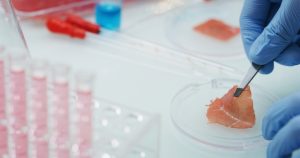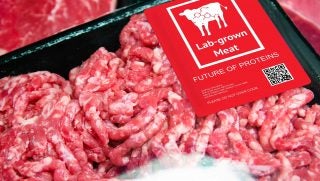Florida state House Rep. Tyler Sirois (R-Cape Canaveral) has introduced a bill to the legislature aimed at banning cultivated meat products in the Sunshine State.
House Bill 435 defines “cultivated meat” as any meat or food product produced from cultured animal cells (yes, this includes lab-grown and cell-based meats). The bill prohibits the manufacture, sale, holding, offering for sale, or distribution within Florida. Violations could land anyone found guilty with a misdemeanor of the second degree and fines of up to $1,000.
Sirois, told Politico that he believes lab-grown meat is an “affront to nature and creation” and is part of the latest initiative in the “ESG agenda.”
“Farming and cattle are incredibly important industries to Florida,” Sirios also told Politico. “So I think this is a very relevant discussion for our state to have.”
Violators could also find their business license suspended upon conviction.
If passed, Florida would become the first state to ban lab-grown meat.

Although no cultivated meat products are currently on the market in the United States, two companies received a “no questions” letter from the U.S. Food and Drug Administration in November 2022 for their cultured chicken products.
Cultured meat has been approved in the European Union. Bene Meat was the first company to receive approval to produce and sell its cultured meat.
In March 2019, the U.S. Department of Agriculture’s Food Safety and Inspection Service and the FDA formally agreed upon a joint regulatory framework to oversee cell collection, banks, growth, and cultivated meat products. During cell harvest, regulation is transitioned from the FDA to the FSIS. After harvest, the FSIS is responsible for overseeing the post-harvest processing and labeling of all food products made from cells of livestock and poultry.
Proponents and creators of cell-cultivated or cultured meat say that they hope their products will reduce the environmental impacts of livestock grazing and feeding.
“Instead of all of that land and all of that water that’s used to feed all of these animals that are slaughtered, we can do it in a different way,” Josh Tetrick, co-founder and chief executive of Eat Just, which operates Good Meat, told The Associated Press in June.
»Related: Researchers are developing meat from immortal stem cells


